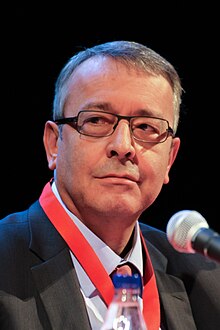Antoine Frérot
| Antoine Frérot | |
|---|---|

Antoine Frérot in Forum Libération, Grenoble, in January 2012
|
|
| Born |
June 3, 1958 Fontainebleau, France |
| Nationality | French |
| Alma mater |
École Polytechnique École des ponts ParisTech |
| Occupation | CEO of Veolia |
Antoine Frérot (born June 3, 1958 in Fontainebleau) is a French businessman. He is the chief executive officer of Veolia Environnement.
Having graduated from École Polytechnique in 1977, he enrolled at École Nationale des Ponts et Chaussées, where he obtained a PhD in civil engineering. During his 7-years at the university, he co-founded a research laboratory dedicated to the study of environmental sciences, with an emphasis on hydrology.
In 1981, Frérot began working as engineer and researcher at the Central Research Office for French Overseas Departments and Territories, a company specialized in big development projects.
Two years later, he joined CERGRENE, a think-tank affiliated with his alma mater, where he served as project manager and then associate director from 1984 to 1988.
Between 1988 and 1990, Frérot worked at Credit National as finance operations manager for major transport, aerospace and heavy machinery enterprises.
In 1995, 5 years after he joined Compagnie Générale des Eaux (originally as its task-force director), Frérot became the CEO of Compagnie General of Automobile Enterprises and CGEA Transport.
In June 2000, he was appointed as a board member of Vivendi Environnement and CEO of CONNEX, the transport division of the group.
Since 2003, Frérot has served as CEO of Veolia Water, as well as assistant director-general, and member of the board of executive directors, of Veolia Environnement.
In 2009, Frérot was nominated to be the CEO of the Veolia group. Soon after Henri Proglio, the former director-general, stepped down in November to join Électricité de France, Frérot took over as the company's CEO. In addition to that, on December 12, 2010, he also became the Chairman of Veolia Environnement. Frérot's goal is to manage a "focused and reactive" enterprise whose activities are aligned with demands of the market and piloted by the State. As he explains: "Veolia’s culture is based on the strategy of decentralization, subsidiarity, and entrepreneurship."
In 2013, Frérot began to reorganize the Group in order to adopt a more international model. While doing that, he changed the marketing strategy so as to direct the company towards high-volume markets with greater surplus value (difficult to eradicate pollution, circular economies, a bigger clientele).
...
Wikipedia
